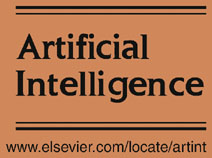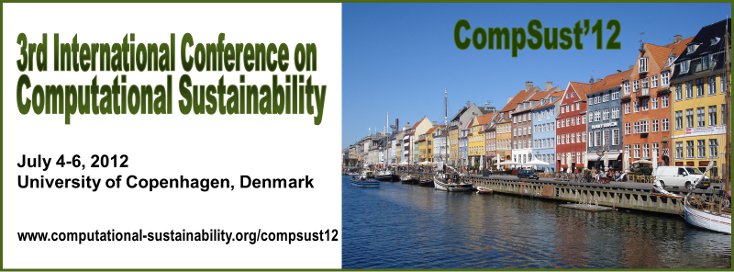CompSust'12: 3rd International Conference on Computational Sustainability
Conference papers and slides available here and Master Class slides available here
Location: Biocenter, University of Copenhagen, Copenhagen, Denmark (floorplan with session locations marked may be found here).
Date: July 5-6, 2012 (master class held July 4, 2012)
Conference Poster: Coming Soon
Important Dates
| Abstract submission | May 7th, 2012 |
| Notification of acceptance | May 20th, 2012 |
| Master class early registration deadline | May 27th, 2012 |
| Conference early registration deadline | May 27th, 2012 |
| Master class | July 4th, 2012 |
| Conference | July 5th-6th, 2012 |
The conference focuses on computational methods for balancing environmental, economic, and societal needs for a sustainable future. Through talks, discussions, poster sessions, and invited talks, the conference program will investigate the major problem domains that impact global sustainability, those technologies and processes that offer the greatest opportunity to increase sustainability in these domains, and the fundamental computational methods that support these technologies and processes. Participants include representatives from national and international research institutions and government agencies. CompSust’12 will also introduce a new Master Class component, providing high level tutorials in mainstream computational sustainability research directions.
Topics Covered
Sustainability domains and areas to be covered include the following:
- Natural resources and the environment (for example, atmosphere, water, oceans, forest, land, soil, biodiversity, species, and so on.)
- Economics and human behavior (for example, human well-being, poverty, infectious diseases, over-population, resource harvesting, and so on.)
- Energy resources (for example, renewable energy, smart grid, material discovery for fuel cell technology, and so on.)
- Human-built systems and land use (for example, transportation systems, cities, buildings, datacenters, food systems, agriculture, and so on.)
- Climate (for example, combining the predictions of climate model ensembles, impact of climate change on land use, data assimilation, and so on.) and so on.)
Computational methods include:
- Modeling and prediction of dynamic and spatiotemporal phenomena and systems. Examples include bird migration, invasive species diffusion, ocean spatial impacts of climate change, and poverty mapping.
- Control and optimization of dynamic and spatiotemporal systems. Examples include constraint reasoning and optimization, MDPs/POMDPs, stochastic programming, model-based reasoning, and optimal control of hybrid dynamical systems for management and control of complex systems ranging from ecosystems and natural resources, to human-built systems such as transportation and energy networks, communities, and cities, to social-economic phenomena.
- Network modeling, prediction, and optimization. Examples include transportation networks, power grid, food networks, epidemic networks, and social networks.
- Modeling and control of complex high-dimensional systems by combining physics-based models, model-based reasoning, optimization and control methods, and machine learning models built from sensor data. Examples include global and regional climate models, ecosystems models, models of operation of office buildings and data centers.
- Modeling the interactions of agents with different and often conflicting interests: multiagent systems, multiagent equilibrium models, game theory, and design of effective mechanisms and policies for the exchange of goods.
- Sensor networks for monitoring environments: data collection, analysis, synthesis, and inference in large-scale autonomous sensor networks.
- Support for public engagement and decision making by the public; collecting, modeling, and presenting relevant information via usable interfaces; preference elicitation and automated decision making for power purchases (managing the timing of appliance loads to minimize cost while maximizing preferences); crowd-sourcing and citizen science; computer games and intelligent tutoring systems; and models, methods and tools for dissemination and increasing awareness of sustainability practices.
Sponsors
Thanks to the Institute for Computational Sustainability and the Artificial Intelligence Journal for sponsoring CompSust'12. Thanks to the IT University of Copenhagen for sponsoring local organization. Thanks to the Global Biodiversity Information Facility and the University of Copenhagen for sponsoring meeting facilities.




